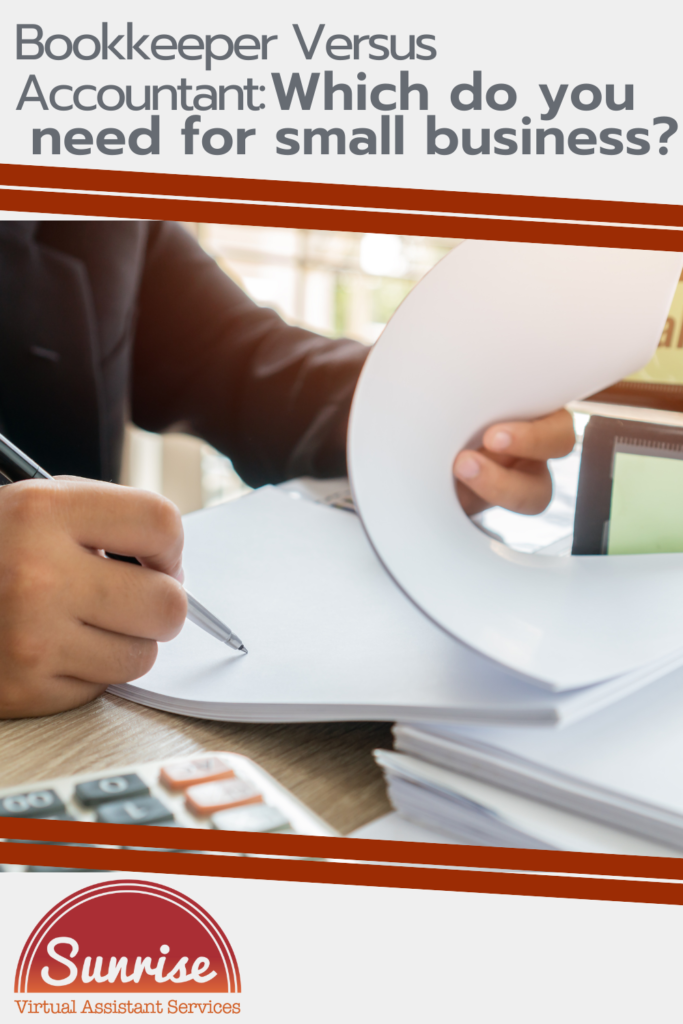As a small business owner, you understand the need to keep your finances in order. However, understanding the distinct differences between a bookkeeper versus accountant may need clarification.
Both professionals can help you manage your finances, but they have different roles. A bookkeeper is responsible for recording and organizing financial transactions, while an accountant provides a more holistic view of your business’s financial records, analyzing data and offering advice on financial planning. Depending on your business needs, you may require one or both of these experts to help you navigate the complexities of financial management.
So, which do you need for your small business? Let’s explore the differences and benefits of each to determine the right choice for your company.
What Does A Bookkeeper Do?
A bookkeeper is an individual who is responsible for maintaining an accurate and up-to-date record of a company’s financial transactions. Their primary duty is to ensure that every financial activity carried out by the company is precisely recorded and documented. This includes keeping track of all incoming and outgoing transactions, managing payroll, issuing invoices, reconciling bank statements, and maintaining accurate company expense records.
Besides recording transactions, a bookkeeper plays a vital role in preparing reports that help business owners make informed decisions. Bookkeepers typically provide timely reports on the company’s finances, like income statements, balance sheets, day-to-day transactions, and cash flow statements. This report is ultimately used by financial professionals such as accountants, financial advisors, or auditors to deliver a more comprehensive analysis of the company’s financial situation.
A bookkeeper uses several tools to complete their duties. These tools include accounting software, databases, and spreadsheets, which help them generate reports and maintain accurate records. They also need to be proficient in basic accounting principles and possess strong attention to detail, as errors in financial records can prove costly to a business.
To summarize, a bookkeeper is a critical member of any small business since they maintain an accurate record of the company’s financial transactions and provide valuable insights that managers need to make informed business decisions. With their skill set, they ensure that financial data is accurate, accessible, and well-organized, which ultimately helps the business to thrive and grow.
Benefits of hiring a bookkeeper
Hiring a bookkeeper for your small business can bring numerous benefits that you may have yet to consider. While an accountant can be essential for tax preparation and financial analysis, a bookkeeper can handle the day-to-day financial management crucial to your company’s success.
One of the most important advantages of hiring a bookkeeper is their expertise in managing financial records and ensuring accurate bookkeeping. This can save you significant time and effort that you would otherwise spend on creating and maintaining financial records on your own. Most small business owners have enough to deal with, so this role is usually assigned to an in-house employee, or outsourced to professional bookkeeping services.
Furthermore, a bookkeeper can assist in identifying cash flow problems and developing strategies to improve your business’s financial stability and profitability. They can also help with creating and maintaining a budget, tracking income and expenses, and invoicing clients.
In addition, hiring a bookkeeper can help you avoid costly mistakes that can damage your business (accountants can also, and this is one area these two professionals can excel at). Accurate record-keeping can help you avoid common tax errors, such as late or inaccurate tax filings, which can result in fines and legal trouble.
Not to mention, a skilled bookkeeper can help you prevent fraud and embezzlement from occurring within your company.
What Does An Accountant Do?
An accountant is a financial professional responsible for managing and analyzing the financial transactions of companies, organizations, and individuals. Their primary duty is to ensure that all financial statements and records are accurate, up-to-date, and compliant with relevant accounting standards and regulations.
Accountants are experts in financial reporting, bookkeeping, tax preparation, and auditing. They use their knowledge and skills to assist businesses and individuals in managing their financial affairs, analyzing financial data, preparing financial reports, and advising on fiscal policies.
Moreover, an accountant plays a significant role in maintaining the financial health of a business. They monitor and analyze financial statements, investigate discrepancies, identify problematic trends, and recommend corrective actions to improve the organization’s economic performance.
With the rise of technology and automation, accountants must also be proficient in using the best accounting software and applications to manage the interpretation of financial data and processes. Staying up-to-date with new accounting regulations, standards, and legislation to ensure their clients remain compliant with the latest changes, are all good signs of a seasoned professional accountant.
In addition to their technical expertise, accountants must possess strong analytical, communication, and interpersonal skills to be effective in their roles. They need to communicate complex financial information to non-financial stakeholders, negotiate with vendors, and build strong relationships with clients.
When it comes to the qualifications of accountants, it’s impressive to see their level of expertise. Their capabilities usually depend on their experience, licenses, and certifications. To become an accountant, one must first earn a bachelor’s degree from an accredited college or university. This educational requirement helps accountants establish a solid foundation in accounting, taxation, and auditing.
Accountants are known to excel in their profession by obtaining several specialized accounting certifications, expanding their skill sets and gaining well-respected positions within larger organizations. The certified public accountant (CPA) credential is one of the most sought-after designations. To obtain this certification, accountants must pass rigorous exams covering various aspects of large and small business accounting, including financial reporting, auditing, and taxation.
Benefits of hiring an accountant
While bookkeepers can help small businesses maintain accurate financial records, accountants tend to offer a more comprehensive range of benefits that can significantly improve a company’s financial health and growth potential. Here are some of the benefits of hiring an accountant for your small business:
1. Tax Planning and Preparation:
An accountant can help small businesses minimize their tax liability by identifying deductions and credits that bookkeepers often overlook, or just aren’t aware of. They can also assist with tax planning, advise on the best tax structure for your business, and ensure that your tax returns are filed accurately and on time.
2. Financial Statement Analysis:
Accountants are trained to provide a more comprehensive picture of a company’s financial performance through financial statement analysis. They can help small business owners understand and interpret their financial statements, which can help them make informed decisions about the future of their business.
And yes, if you already have a bookkeeper, they can work together on these aspects.
3. Business Planning and Strategy:
A certified public accountant can offer valuable insights and advice on business planning and strategy. With years of experience backing, they can help small business owners create realistic financial projections and identify areas where they can cut costs or increase revenue.
4. Financial Management:
Accountants can help small businesses establish sound financial management practices, such as cash flow management, budgeting, and forecasting. This can help enterprises to manage their finances better and avoid financial surprises.
5. Audits and Compliance:
In many cases, small businesses are required to undergo audits or comply with various financial regulations. An accountant can help small businesses prepare for audits or assure compliance with financial regulations.
Bookkeeper Versus Accountant: Which Is Better?
Despite these differences, one cannot necessarily be considered “better” than the other. Both bookkeepers and accountants serve valuable purposes for small businesses, and their roles often overlap. For example, a bookkeeper may work closely with an accountant to provide financial data and reports for tax preparation.
Both bookkeepers and accountants require specific skills and expertise to excel in their roles, and both sets of professionals benefit the small business owner (regarding business finances).
It is also worth noting that hiring a bookkeeper or accountant can significantly impact a small business’s bottom line. While bookkeepers may be less expensive than accountants, accountants can often provide more insights and advice to help a business grow and succeed. So, there are positives and an equal amount of drawbacks with each.
Key Takeaway
Ultimately, the decision to hire a bookkeeper or accountant will depend on your small business’s specific needs and goals.
If you don’t have a bookkeeper, but you already have an accountant, you may want to think about offloading the workload. If you have an in-house bookkeeper, but struggle with tax prep, hiring an accounting service is a great idea (especially considering possible tax implications from mistakes)!
It just depends on not just what you need; but what you want.
Bookkeeping Made Easier
Sunrise Virtual Assistant Services recognizes that managing finances can be daunting for small businesses and entrepreneurs. We offer comprehensive and affordable bookkeeping services to cater to their unique financial needs.
Our team of expert bookkeepers can handle day-to-day accounting tasks such as recording financial transactions, managing invoices, and reconciling bank statements. We also provide financial reporting services, which include generating income statements and balance sheets, forecasting cash flows, and analyzing financial data to help businesses make informed decisions.
Plus, our bookkeeping services are high-quality, reliable, and tailored to meet each client’s specific needs. We use modern technology and software like Quickbooks Online to ensure accuracy, efficiency, and security. With our bookkeeping services, small businesses and entrepreneurs can save time, reduce stress, and focus on what they do best – growing their businesses. We understand that every penny matters, so our bookkeeping services are affordable, flexible, and customizable to fit any budget.
Sunrise Virtual Assistant Services is the go-to partner for small businesses and entrepreneurs who need comprehensive and affordable bookkeeping services. Contact us today and let us help you take care of your finances so you can focus on what matters most – your business.


